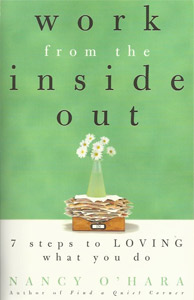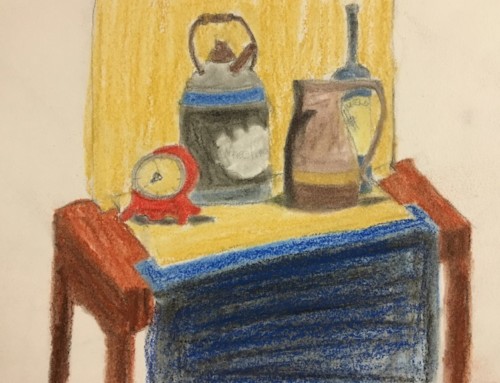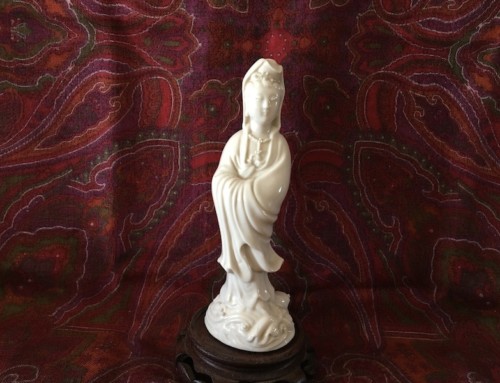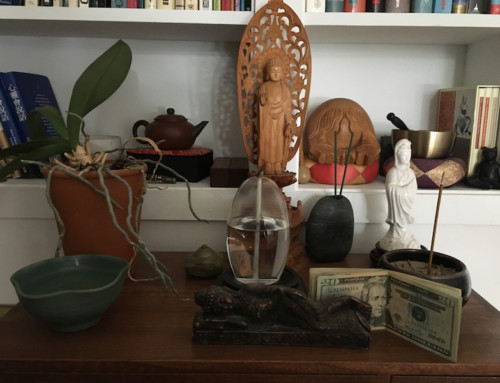Our Ordinariness
…continued from 7 Steps to Loving What You Do – Discovery 1:4 – Follow the Leader
Do you compartmentalize your life? Do you have a work persona that is different from your leisure persona or the persona you bring to your intimate relationships? Who is the self that you bring to work each day?
Let’s examine for a moment the various elements that combine to create the idea we have of this self that we bring to work.
First, each of us has a physical form, a body, that has (if we’re lucky) five sense organs (eyes, ears, nose, tongue, body) and a mental organ, our mind.
Second, each of us goes out into the world with these six faculties and experiences physical and mental sensations through them, that is, we feel things.
Third, these six faculties then combine to give us our perception of the world, what we think.
Fourth, we develop, condition and control these six faculties as we go out into the world. How we choose to use them—our volition—determines how we get along in the world.
Fifth, we, our selves, are not separate from these faculties; they merely combine to give us our idea of self. Thus we become conscious or aware of visible things through our eyes, of sound through our ears, of scent through our nose, of taste through our tongue, of tangible objects through our touch, of thought through our mind. Our sensations and perceptions carry us to an awareness of the world, to consciousness.

Our Daily Bread
So then, we have these five states—form, feeling, thought, volition, consciousness—that, along with our five senses and mental faculties, combine to give us our personality, our sense of self, our being. We respond physically and mentally to the conditions around us. And if we were not ordinary humans we would simply accept whatever happened. We would see things for what they are and know that we are each a mere part of the whole, that everything and everyone is interconnected and that there really is no separated, individuated self. There is merely a perception, an idea of self. We would be blissfully happy no matter what was going on around us, living from our innate nature.
But who of us can claim to have such an acceptance and understanding of the world? Not many, I dare say, though there may be a few. But it is possible to move ever closer to this. We are capable of it. And since we do have control over our senses and mental faculties we can move in the right direction, especially once we grasp the concept that there is no self outside of these six faculties moving us along. And even before we fully grasp this (for it takes time and practice to realize it) we can take steps to form a clearer understanding of who and what we really are.
Please keep in mind that it is not easy to grasp the concept of innate nature. It cannot be conceived of or imagined. It is something beyond explanation. We cannot think or feel our way to an understanding of it. It is not what some people call our soul. It is not God. It is not Ego. It does not have a form.
Our five conditioned states—form, feeling, thought, volition, consciousness— are constantly in flux, are ever changing. Our innate nature doesn’t change. Our six faculties—seeing, hearing smelling, tasting, touching, thinking—never remain the same from one moment to the next. Our innate nature is consistent and constant. Yet it has no substance. It cannot be thought into existence. It just is. It is stillness, though that doesn’t define it. It is ever present. Because of that we have a chance to discover it, to uncover it, to become aware of it, to awaken to it. All of life has it. All of non-life has it. It is the thread that holds everything together. It is the spaces between everything. It is silence. It is emptiness. It is nothing. No thing. No form, no feeling, no thought, no volition, no consciousness. It is that which will ease our suffering and bring us joy. No eyes, no ears, no nose, no tongue, no body, no mind. There is no easy way to understand this. Relax. You needn’t try to find it. If you are patient and if you truly want to be happy and if you do the work that’s necessary, it will find you. And when it does you will know it. And you’ll know how near it has always been. Relax, for you are in it now.
So how does all this relate to work, to loving your work and doing what you love? Well, before you can address the outside issues you have to spend a little time inside getting to know yourself. You need to become acquainted with whom you bring to work each day. And even if you doubt that there’s a connection to happiness at work, do the exercises anyway. This work will benefit your “real” work. I guarantee it. And you may even start to question what the real work in your life is.
_________________________________________________
- Write about your six faculties (seeing, hearing, smelling, tasting, touching, thinking) and how they inform your view of the world, your awareness of people, places and things, your behavior, your thoughts and feelings.
- Which of the six do you rely on most heavily to make your way in the world? Which brings you the most joy? The most pain? Describe the joy and pain that each brings you. Which is your favorite?
- Describe your attitudes and feelings about work, first in general and then specifically about your current job. Where do these feelings come from? Are they based in reality? Can you see that sometimes your feelings are just feelings and not the facts? Can you allow yourself to feel your feelings without carrying any judgments of yourself or others with them? Can you forgive yourself for being an ordinary human with feelings? Can you just accept them as yours and not expect the world to conform to them?
_________________________________________________
For the next week pay special attention to your five states and six faculties. When you see something, ask yourself who is it that’s doing the seeing? Who is it that hears, tastes, smells and touches? Who thinks your thoughts? Don’t be concerned about finding the correct answer, or any answer for that matter. Be content just to ask the questions. Hone your awareness of yourself.
Take some time each day to find a quiet spot to sit alone and just breathe. As you concentrate on your breath, listen for the answers. Listen with your whole body.
When a thought takes you away from your breath concentration, ask yourself who had the thought in the first place, if you were concentrating on breathing, and who then realized that you were having that thought. Maybe there’s an answer, maybe not. For now it’s enough to be asking the questions. Each time you become aware of some discomfort in your body, ask yourself who is experiencing the pain. Then return to your breath. Just breathe. And swim in the ordinariness of your being.
To be continued…
from Work From the Inside Out – 7 Steps to Loving What You Do






You make it sound so simple. Ahh, maybe it is!
[…] …continued from 7 Steps to Loving What You Do – Discovery 1:5 – Our Ordinariness […]